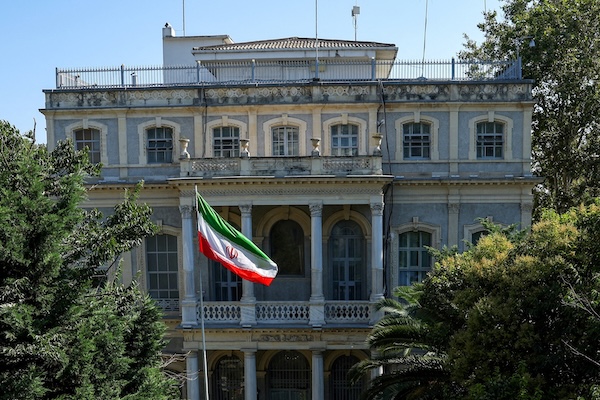 General view of the Iranian Consulate where Iran holds nuclear talks with so-called E3 group of France, Britain and Germany, in Istanbul, Turkey, 25 July 2025;
Credit: Reuters/Dilara Senkaya
General view of the Iranian Consulate where Iran holds nuclear talks with so-called E3 group of France, Britain and Germany, in Istanbul, Turkey, 25 July 2025;
Credit: Reuters/Dilara Senkaya
GENEVA/UNITED NATIONS (Reuters) - France, Britain and Germany met with Iran on Tuesday 26 August 2025, to try to revive diplomacy over its nuclear program before they lose the ability to reimpose United Nations (UN) sanctions on Tehran.
The trio, known as the E3, is ready to trigger a so-called snapback of UN sanctions in the coming days over accusations that Iran has violated a 2015 deal with world powers that aimed to prevent Tehran from developing a nuclear weapon.
But they have offered to delay such a move for a limited time if Iran resumes UN inspections - which would also seek to account for Iran's large stock of enriched uranium - and engages in talks with the United States.
To do this, the UN Security Council would have to extend a 2015 UN Security Council resolution that enshrined the nuclear deal. It is currently due to expire on 18 October 2025 and Germany, France and Britain would lose the ability to trigger a snapback of UN sanctions.
Tehran has warned of a "harsh response" if sanctions are reinstated. Talks between the E3 and Iran are tense as Tehran is furious at the bombing in June 2025 of its nuclear facilities by the US and Israel.
In an unexpected move, Russia and China - also parties to the nuclear deal - circulated a draft resolution to the fifteen council members on Sunday 24 August that would extend the nuclear deal until 18 April 2026.
However, a revised Russian and Chinese draft text shared with council members on Tuesday 26 August also seeks to suspend "any substantive action on any matters related to the implementation of resolution" or the nuclear deal by the Security Council - language that is likely to raise concerns among the E3.
A senior Russian diplomat, speaking on condition of anonymity, told Reuters this language would block the E3 from reimposing UN sanctions on Iran. It was not immediately clear when the draft resolution could be put to a vote.
"It is time for the E3 and the UN Security Council to make the right choice and give diplomacy the time and space it needs," Iranian Deputy Foreign Minister Kazem Gharibabadi said in a post on X after the meeting with Germany, France and Britain in Geneva.
Iran buying time?
Iranian foreign ministry spokesperson Esmaeil Baghaei said communication with the E3 would continue in the coming days.
Western officials have said they suspect Iran has returned to negotiating tactics aimed at buying time and dragging out talks.
"We are going to see whether the Iranians are credible about an extension or whether they are messing us around. We want to see whether they have made any progress on the conditions we set to extend," said one E3 official, speaking on condition of anonymity, before Tuesday's talks.
Iran has been enriching uranium to up to 60% fissile purity, a short step from the roughly 90% of weapons-grade and had enough material enriched to that level, if refined further, for six nuclear weapons before the strikes by Israel started on 13 June 2025.
Actually producing a weapon would take more time, however, and the International Atomic Energy Agency has said that while it cannot guarantee Tehran's nuclear programme is entirely peaceful, it has no credible indication of a coordinated weapons project in the Islamic Republic.
Israel and the United States have said they needed to strike Iran's uranium enrichment sites because the country was making such rapid advances towards the ability to produce a nuclear weapon.
Tehran denies any intention to develop atomic bombs.
While Iran's enrichment plants were badly damaged or destroyed in the June war, Tehran has not granted the IAEA access to them since then, arguing that it is not safe for inspectors. The status and whereabouts of Iran's large stockpile of enriched uranium are also unclear.
"Due to the damage to our nuclear sites, we need to agree on a new plan with the agency - and we’ve conveyed that to IAEA officials," one Iranian official said.
IAEA chief Rafael Grossi told Fox News on Tuesday 26 August that "the first team of IAEA inspectors is back in Iran," but that the agency was still discussing with Tehran the practical modalities of resuming inspections.








